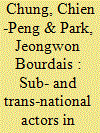| Srl | Item |
| 1 |
ID:
186610


|
|
|
|
|
| Summary/Abstract |
This article focuses on the varying intensity of political clash that South Korea has got involved in with Japan regarding the territorial dispute, Dokdo/Takeshima. Existing works are limited to acknowledging the role of nationalism as a key obstacle to the negotiation or settlement of the territorial dispute. However, democratically elected Korean leaders at times remained low key in the territorial problem and even sought collaboration with Japan despite the existence of nationalism. Specifically, South Korea employed both calm and hardline diplomatic choices in the territorial dispute. Why did South Korea choose disparate territorial policies despite the population’s anti-Japanese sentiments? Under what circumstances did leaders in Korea employ dovish diplomacy that might cause a strong backlash from the public? Introducing the vulnerability-restraint theory, I argue that top decision makers’ political vulnerability in domestic politics and the restraining pressure from the United States have impact on the final choice of foreign policy.
|
|
|
|
|
|
|
|
|
|
|
|
|
|
|
|
| 2 |
ID:
137138


|
|
|
|
|
| Summary/Abstract |
This paper joins the debate on Japan's territorial dispute with South Korea over the Dokdo/Takeshima islets. Informed by the ontological security framework of analysis, this paper seeks to explain the decision to adopt the ‘Takeshima Day’ ordinance by the Shimane Prefectural Assembly and the subsequent ascendance of ‘Takeshima’ to the fore of Japan's identity construction vis-à-vis the Korean ‘other’. In this paper, I distinguish between two processes: one that led to the adoption of the ordinance and another that resulted in the entrenchment of ‘Takeshima’ in Japan's identity construction vis-à-vis the Korean ‘other’. The paper argues that the former process should be understood within the context of Shimane Prefecture's distinct identity construction vis-à-vis Tokyo, while the latter can be attributed to recent changes in Japan–Korea relations unrelated to the territorial dispute per se.
|
|
|
|
|
|
|
|
|
|
|
|
|
|
|
|
| 3 |
ID:
157477


|
|
|
|
|
| Summary/Abstract |
This paper provides a political analysis on two territorial disputes that South Korea has with Japan over Dokdo/Takeshima and with China over Iŏdo/Suyan Rocks, as well as on their implications for the Northeast Asia region, focusing on the roles of sub-state actors and the United States as a third party trans-national actor. It mainly explores why South Koreans consider territorial claims by Japan and China such an affront as to require strident demonstration of ownership, especially since they already exercise effective control over the territories under dispute. It also explores what actions the South Korean government would take in the event of maneuvers or attempted landings by security forces or nationalists/fishing boats from China on Iŏdo or Japan on Dokdo. Employing Robert Putnam's Two Level Game Framework, the paper provides comparative insights on how these cases have been developed to date through interactions between Level I, official negotiators, and Level II, sub- and trans-national actors. The two cases demonstrate that the state is not a unified actor, and non-state actors' nationalistic collective sentiment has played (and will play) a greater role in shaping the directions of (potential) conflicts over Dokdo and Iŏdo.
|
|
|
|
|
|
|
|
|
|
|
|
|
|
|
|